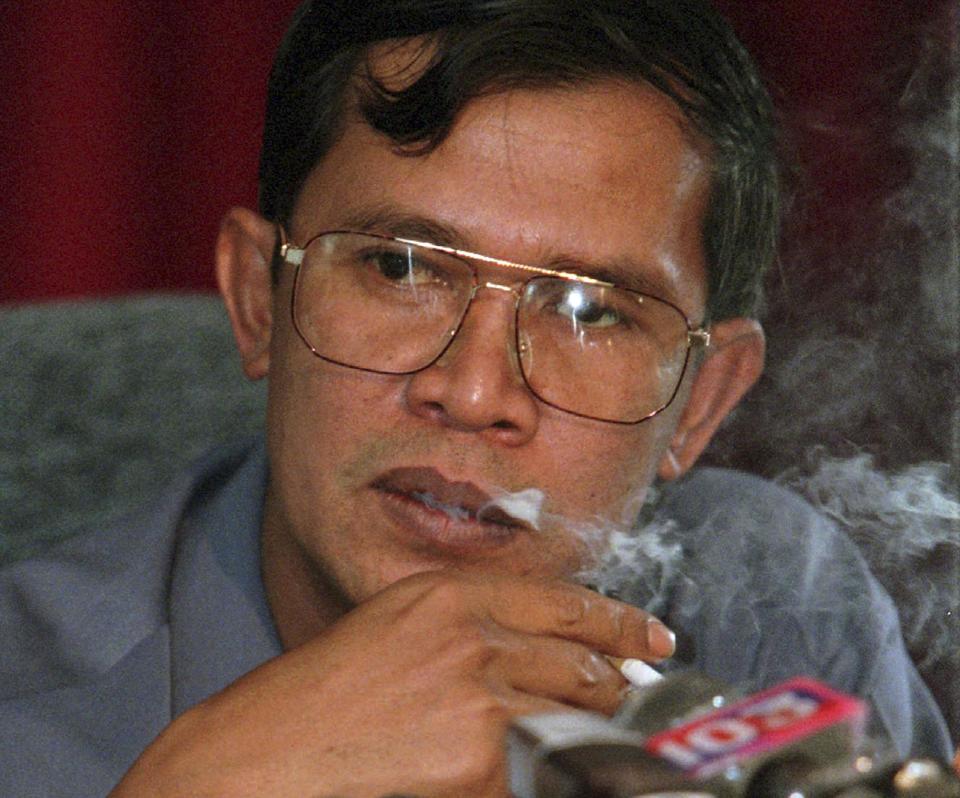Seen and heard on Ms. Theary C. Seng's Facebook accounts:
www.facebook.com/theary.c.seng
www.facebook.com/theary.c.seng
 |
| In this April 19, 1997 file photo, then Cambodian Second Prime Minister Hun Sen smokes a cigarette during a news conference held in his compound at Takhamao, south of Phnom Penh, Cambodia. Hun Sen, Cambodia's tough and wily prime minister, marked 30 years in power Wednesday, January 14, 2015, one of only a handful of political strongmen worldwide who have managed to cling to their posts for three decades. (AP Photo/Charles Dharapak, File) |
Based on a response to media inquiry (well-known wire service) which I've since edited and expanded:
Thirty years ago, Vietnam gave birth to Hun Sen the Prime Minister.
Thirty years later, the umbilical cord of Hun Sen and his CPP to Vietnam
has not been severed. As a puppet of a historically aggressive, more
powerful neighbor, whose annexation of Cambodia consistently over the
years are well-documented but of little interest to non-Cambodians, Hun
Sen has consistently appeased and catered to the whims of its political
master Vietnam. The facts are indisputable.
However, these
continuing national security concerns vis-a-vis Vietnam have been
overshadowed by virulent charges of racism by foreigners of Cambodians.
The unfortunate and potentially dangerous effect has been the silencing
of any robust discussion. This in turn leaves the Cambodians frustrated
that they can't even express freely what they daily experience in their
own home--the flooding of illegal immigrants--while simultaneously unfairly denounced with the ugly moniker of racism.
The
consequences of this puppetry for Cambodia has been detrimental for the
country's development and Cambodians' healing and well-being since the
first day of occupation in January 1979 with the cordoning and
plundering of Phnom Penh.
It is believed that Vietnam appointed
Hun Sen when prior appointees have been less than willing to implement the
policy of the genocidal K-5 plan and the larger policy of "eating
silkworm", that is, Vietnamization and outright annexation through the
flooding of Vietnam's undesirables (de facto) and coercive territorial
agreements (de jure). Hun Sen witnessed firsthand what happens should he
deviate from the wishes of his brutal master: imprisonment of Pen
Sovann (1st PM under occupation) in Hanoi, the murder of Chan Si (2nd
PM) while in office.
Since then, the unrelenting destruction of
Cambodia under the leadership of Vietnam using the hands of Hun Sen has
included the handing over more and more of national security and
intelligence via Metfone whose parent company is Viettel of the
Vietnamese military, national airlines which effectively is Vietnamese,
the agreement for Vietnam to fly over Cambodia airspace, the destruction
of land and sea via egregious contractual terms and conditions with
Vietnam, and more recently the Vietnamization of provinces along the
border with Vietnam under Hok Lundy and most recently in Kep and Kampot
under the guise of religion and assisted by Okhna Sok Kong who publicly
stated he's proud to be Vietnamese.
It is superficially true
that relative peace and stability occurred during the reign of Hun Sen's
three decades in power. But Hun Sen's "achievements" are only relative
to the blackness of the Khmer Rouge. Besides extinction (which first
Vietnam stemmed and the international community resuscitated the country back to life), Cambodia
could not have fallen any lower in the scale of misery.
Currently, Cambodians are not masters of their own home or future; they
are slaves, servants and coolies who do the bidding of the wealthy, be
they the Cambodian elites or the foreign guests. Cambodians are not
agents of their lives and future; they lack agency. Hun Sen is
responsible for this dire state of affairs.
Over the past three
decades of rule, Hun Sen has destroyed the natural resources and
tendered away heritage and cultural rights to non Cambodians and those opposed to the prosperity and sovereignty of Cambodia. The economic
growth resulted from international assistance and the one-off in the
selling of natural resources. Once gone, they're gone.
Hun Sen's
30 years in power reflects his autocratic rule of aggression and
violence. Examples abound over the years of his anti-democratic
iron-fist rule where any opposition to his rule is violently crushed.
Hun Sen's 30 years in power put him in the rarefied Club of Moldy
Autocrats. However, globalization and the democratic surge of young
Cambodians of the last election may have dulled the glow of infamy for
these anachronistic megalomaniacs.


I love your article . I hope very much that you stay true to serve Cambodia and its people.in which ever you can. Our job now is to get rid of this dictator and whatever else comes next would be easier..
ReplyDelete